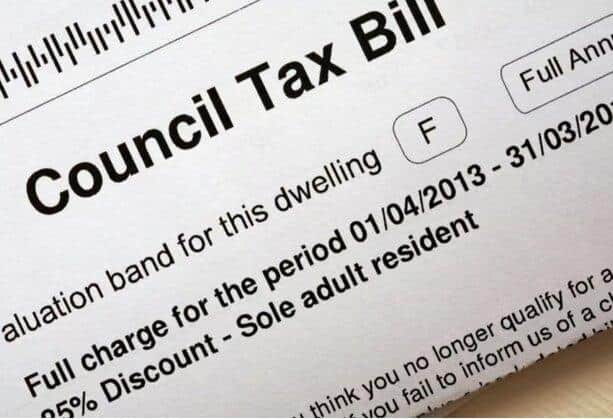Aim to scrap council tax for poorest Preston households ‘in the coming years’
and live on Freeview channel 276
Preston City Council’s deputy leader, Martyn Rawlinson, says he wants to see a return to the situation where the poorest households do not have to make any contribution to the council tax pot.
That was how the system operated nationwide until a decade ago when changes introduced by the then coalition government saw council tax benefit scrapped and responsibility devolved to individual authorities to come up with their own support programmes for those most in need.
Advertisement
Hide AdAdvertisement
Hide AdHowever, the 2013 overhaul came with a cut in funding for the new localised schemes, which meant that councils had to decide whether to absorb the extra cost themselves or start charging those on low incomes council tax, albeit at a significantly reduced rate.


In Preston, working-age households have since had to stump up at least 20 percent of the full amount that they would have had to pay if they were not eligible for help under the city’s Local Council Tax Support (LCTS) arrangements. But only around half of the money due from the occupiers of those properties is collected in the year that it is due.
Currently, almost 11,600 Preston residents claim LCTS assistance in Preston. Sixty-nine percent of them are working-age people on low incomes and the remainder are pensioners.
Cllr Rawlinson told a recent city council meeting that even after ten years, there was “no culture for people on benefits to pay council tax” - and said that he hoped the authority would be able to stop asking them for a contribution in the foreseeable future.
Advertisement
Hide AdAdvertisement
Hide Ad

Speaking later to the Lancashire Post, he added: “We're trying to collect it from people who can't really afford it anyway - that was always the case, but we weren't in a position to do anything else. [However], I feel we might be able to [make changes] in the next year or two…so that people on income-related benefits - of working age - would pay nothing, as they used to.
“It just takes the pressure off [people] a bit. That's one less bill coming through the door, if we can do it in the future.
"I think it's around a fiver a week for a lot of people, [but] when you're struggling, a fiver a week is important - it can pay for a couple of meals, said Cllr Rawlinson, who is also the cabinet member for resources.
While stressing that the scrapping of the charge for LCTS households was “an ambition not a promise”, he pledged to assess the situation once more was known about the borrowing costs that will be incurred as part of the £45m Animate cinema and leisure development being built in the city centre.
Advertisement
Hide AdAdvertisement
Hide AdCouncillors agreed to continue with the current level of contribution under the LCTS scheme for the 2024/25 financial year. Cllt Rawlinson told them that the authority was "not draconian when it comes to people who can't pay".
"If people can't pay, we will...wait until they can pay. If they won't pay, that’s a different matter [and]…we will collect the money."
Any future change to the system in Preston would require consultation with other so-called ‘precepting authorities’ - those public bodies that receive shares of the overall council tax collected by the city council and which would be affected by scrapping the charge for low-income households. They include the police and fire brigade, along with Lancashire County Council, which takes the greatest proportion of the cash raised.
Papers presented to the town hall meeting where the issue was discussed noted that the preference of the other recipients of council tax had “always been for a cost-neutral scheme that limits the financial pressure on their budgets as an alternative to cutting essential services”.
Advertisement
Hide AdAdvertisement
Hide AdIt is estimated that Preston’s LCTS scheme will cost £11.75m across all tiers of local government in the current financial year. The numbers claiming help in the city have gradually reduced in recent years.
Pensioners who meet the necessary criteria can have their council tax bills covered in full by LCTS - unlike working age benefit claimants. while those who qualify for assistance at a lesser rate because of their circumstances still pay some level of contribution.
Preston would not be the first local authority in the country to scrap council tax for its poorest residents - Vale of White Horse District Council did so this year - and some never introduced a charge as part of the national changes made a decade ago.
When the government scrapped council tax benefit in 2013, it cut comparable funding for the replacement local schemes by 10 percent. However, thinktank the Joseph Rowntree Foundation calculated at the time that after the cost of providing rebates for pensioners was factored in, the cash allocated for LCTS initiatives would cover only 81 percent of the previous council tax benefit budget for working-age claimants nationwide.
Advertisement
Hide AdAdvertisement
Hide AdThe organisation carried out a study which concluded that while there might be some benefits to providing local authorities with more control over aspects of their finances, “the advantages of localising support for council tax seem to be strongly outweighed by the disadvantages”. These were said to include an undermining of the simplification of the Universal Credit system that was then about to be introduced and designed to provide incentives for people to work.